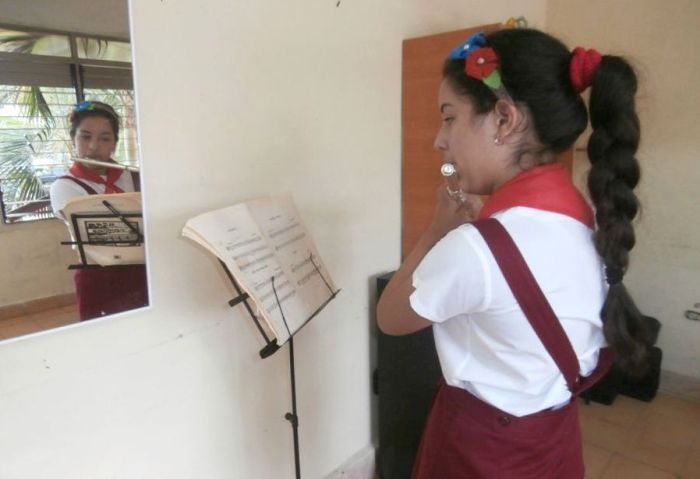
Despite the limitations, artistic education in Sancti Spíritus is committed to breaking the obstacles created by the blockade
Gabriela Alejandra Madrigal dreams of a great ovation. She closes her eyes and imagines a crowded theater. She is standing on the stage, playing a violin solo. The rest of the world is at her feet.
This fifth grader is one of the 178 students of the Sancti Spiritus Ernesto Lecuona Elementary Art School, an institution where strategies and methods must be reinvented every day so as to overcome the impact of the economic, financial and commercial blockade imposed by the USA goverment on Cuba.
Although every student in this school is provided with a musical instrument, detunings have been detected that distort not only the melodies, but the quality of the artistic training.
According to Maida Perez Cancio, director of the institution, they are faced day after day with the effects of the blockade, which has the greatest impact on the wind and string instruments.
“The oboe line of study is one of the most affected because we do not have the spare elements to replace the broken ones. The same happens with the bassoon. The clarinet and the flute are somewhat better thanks to donations received from delegations that have visited the school. But that reality is a concern for the staff, the students and the parents”, said Laura Brunet Ferrer, head of the wind instrument department.
As part of the classes, the professors insist on the need to take care of the musical instruments, and they explain how much the country expends to purchase and repair them.
“From the very first day we were told that the instruments should be kept inside their cases to avoid blows. We are the main responsable for them. We can take them home to study, but we have to be very careful”, said Gabriela Alejandra, who is in the first year of flute.
Every new school year, the Ministry of Culture together with the National Center of Art Schools, allocates large budgets to provide schools with instruments, musical scores, books and a small amounts of accessories.
According to statistics, the educational media used in the training of artists are among the most expensive in the world. At present moment, Cuba has to purchase the essential products for this education in third countries, with the consequent payment of freight, taxes and without an after-sale guarantee. If this were not the case, in addition to monetary savings, instruments could be bought others than those Jinbao branded, coming from China, which are not long lasting.
The low quality of the instruments, their constant use and the effect of humidity on them make the useful life of the accessories very short. Despite the arrangements made by the institution with luthiers for their repair, it is the parents who most of the time take care of this problem, sometimes away from the territory and at very high prices.
Despite the limitations imposed by the hostile policy applied by successive US governments since February 1962, artistic education in Sancti Spíritus is committed to breaking the obstacles created by the blockade.
That’s why, Gabriela Alejandra’s dream might come true and one day she might enjoy the ovations that will recognize her talent and sacrifice.
 Escambray ENGLISH EDITION
Escambray ENGLISH EDITION





Escambray reserves the right to publish comments.